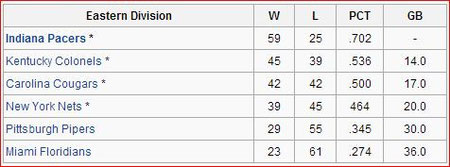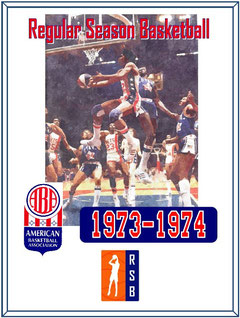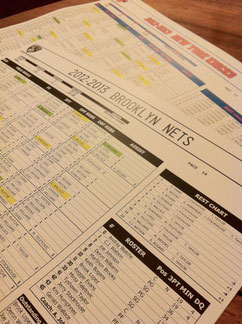Where 'Doctor J.' born

The original ABA was founded in 1967, competing with the well-established National Basketball Association, until the ABA–NBA merger in 1976. According to The NBA Encyclopedia, its long-term goal was to force a merger with the more established league. ABA officials told potential owners that they could get an ABA team for half of what it cost to get an NBA expansion team at the time. When the merger occurred, ABA officials said, their investment would more than double.
Ultimately, four ABA teams were absorbed into the older league: the New York Nets, Denver Nuggets, Indiana Pacers, and San Antonio Spurs. Two other clubs, the Kentucky Colonels, and the Spirits of St. Louis, were disbanded upon the merger. A third, the Virginia Squires, had folded less than a month earlier, missing out on the opportunities that a merger might have provided.
The ABA distinguished itself from its older counterpart with a more wide-open, flashy style of offensive play, as well as differences in rules - a 30-second shot clock (as opposed to the NBA's 24-second clock, though the ABA did switch to the 24 second shot clock for the 1975-76 season) and use of a three-point field goal arc. Also, the ABA used a colorful red, white and blue ball, instead of the NBA's traditional orange ball. The ABA also had several "regional" franchises, such as the Virginia Squires and Carolina Cougars, that played "home" games in several cities.
The freewheeling style of the ABA eventually caught on with fans, but the lack of a national television contract and protracted financial losses would spell doom for the ABA as an independent circuit. In 1976, its last year of existence, the ABA pioneered the now-popular slam dunk contest at its all-star game in Denver.
One of the more significant long-term contributions of the ABA to professional basketball was to tap into markets in the southeast that had been collegiate basketball hotbeds (including North Carolina, Virginia and Kentucky). The NBA was focused on the urban areas of the Northeast, Midwest and West Coast. At the time, it showed no interest in placing a team south of Washington, D.C.
(Source: Wikipedia)
ABA 1969-'70: 10 teams



The 1969-'70 ABA season was the third season of the American Basketball Association. Prior to the start of the season, the Minnesota Pipers moved back to Pittsburgh, the Oakland Oaks moved to Washington, DC and became the Washington Capitols and the Houston Mavericks moved to North Carolina and became the Carolina Cougars. The season ended with the Indiana Pacers capturing their first ABA Championship with Roger Brown and Mel Daniels to dominate the opponents.
(Source: Wikipedia)
TO BUY THIS SEASON: ONLY 14 $ FOR ALL THE 10 TEAMS!
ADVANCED RULES & SPECIAL ABA RULES INCLUDED.
ABA 1973-‘74: 10 teams

| Teams 1973-1974 | Record | Best Player | |
| Eastern Division | |||
| New York Nets | 55-29 | J. Erving (MVP) | |
| Kentucky Colonels | 53-31 | A. Gilmore | |
| Carolina Cougars | 47-37 | B. Cunningham | |
| Virginia Squires | 28-56 | G. Gervin | |
| Memphis Tams | 21-63 | G. Thompson | |
| Western Division | |||
| Utah Stars | 51-33 | W. Wise | |
| Indiana Pacers | 46-38 | G. McGinnis | |
| San Antonio Spurs | 45-39 | S. Nater | |
| San Diego Conquistadors | 37-47 | C. Jones | |
| Denver Rockets | 37-47 |
R. Simpson |
In 1973, Julius ("Dr. J") Erving came back to New York, his hometown, and kindled nationwide interest in the red, white and blue league. To many basketball fans, Erving's colorful highwire act with the Nets became the image of the ABA itself. During his three years with the team, Erving won the ABA MVP Award three times. The Nets won the ABA title two out of those three years. In 1973-'74 season, the Nets had the explosive starting lineup of Erving and Kenon at forward, Paultz at center, and Taylor and Williamson at guard. The team struggled early in the season, starting out 4-10 and enduring a nine-game losing streak. But as soon as the Nets learned to play with each other (and Williamson permanently entered the starting lineup), they became a force. The rest of the season, they went 51-19, earning first place in the Eastern Division. With Erving leading the way, the Nets steamrolled through the ABA Playoffs, losing only 2 games (one to Virginia and one to Utah) on their way to the ABA Championship.
(Source: Remember the ABA site)
TO BUY THIS SEASON: ONLY 14 $ FOR ALL THE 10 TEAMS!
ADVANCED RULES & SPECIAL ABA RULES INCLUDED.
WITH NEW TEAM CHARTS TEMPLATE!
ABA 1974-‘75: 10 teams

| Teams 1974-1975 | Record | Best Player | |
| Eastern Division | |||
| Kentucky Colonels | 58-26 | A. Gilmore | |
| New York Nets | 58-26 | J. Erving (MVP) | |
| Spirits of St. Louis | 32-52 | M. Barnes | |
| Memphis Sounds | 27-57 | G. Carter | |
| Virginia Squires | 15-69 | W. Wise | |
| Western Division | |||
| Denver Nuggets | 65-19 | R. Simpson | |
| San Antonio Spurs | 51-33 | G. Gervin | |
| Indiana Pacers | 45-39 | G. McGinnis | |
| Utah Stars | 38-46 | M. Malone | |
| S. Diego Conquistadors | 31-53 | T. Grant |
In the 1974-'75 season, in the Eastern Conf. under new Coach Hubie Brown, the Kentucky Colonels fought the New York Nets all season for first place. At the end of the regular season both teams were tied at 58-26, they would than win a one game tiebreaker 108-99 at Freedom Hall to win the Division title. In the Western the Denver Rockets became Nuggets and hired Carl Scheer from the recently folded Carolina Cougars. Scheer would bring half the Cougars with him, including Coach Larry Brown. The move would revitalize the franchise right away as the Nuggets finished in first place with an ABA best 65-19 record.
In the playoffs the Colonels eliminated the Memphis Sounds in five games while the Nets were stunned by the Spirits of St.Louis, avoiding the attended showdown with the Colonels. In the West the Nuggets would fly past the Utah Stars in six games to reach the Western Finals. However, in the semifinals, the Nuggets would be stunned by the Indiana Pacers in seven games.
In the ABA Finals the Colonels who had lost two heartbreaking series to the Pacers in the past, came out on fire, taking the first three games. After a 94-86 loss in Game 4, the Colonels came home and finally got the title that had eluded them for so long, winning 110-105 to claim the ABA Championship, as Artis Gilmore was named ABA Finals MVP.
(Source: Remember the ABA site & Sport Ecyclopedia)
TO BUY THIS SEASON: ONLY 14 $ FOR ALL THE 10 TEAMS!
ADVANCED RULES & SPECIAL ABA RULES INCLUDED.
WITH NEW TEAM CHARTS TEMPLATE!
You can do it, too! Sign up for free now at https://www.jimdo.com





